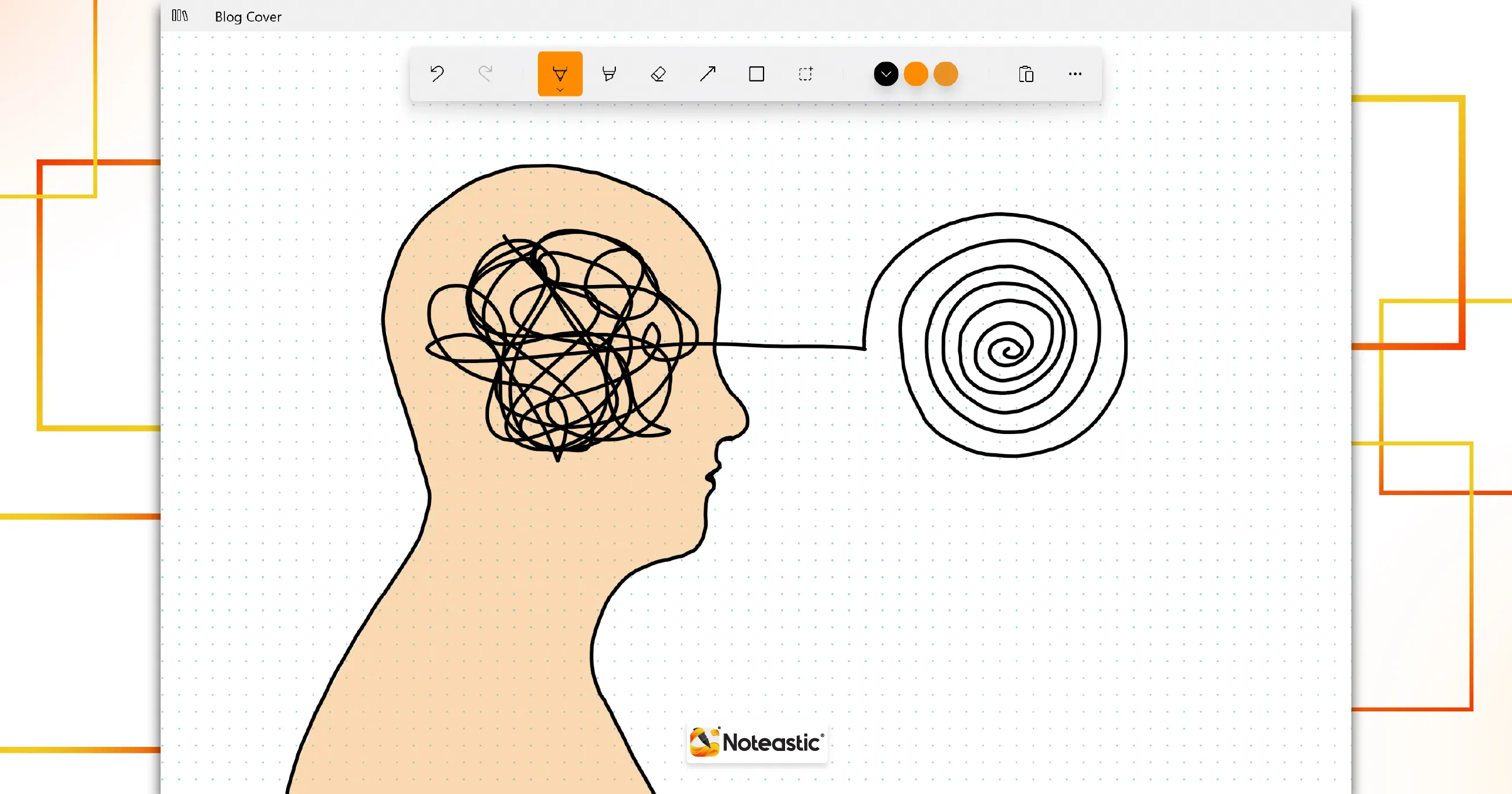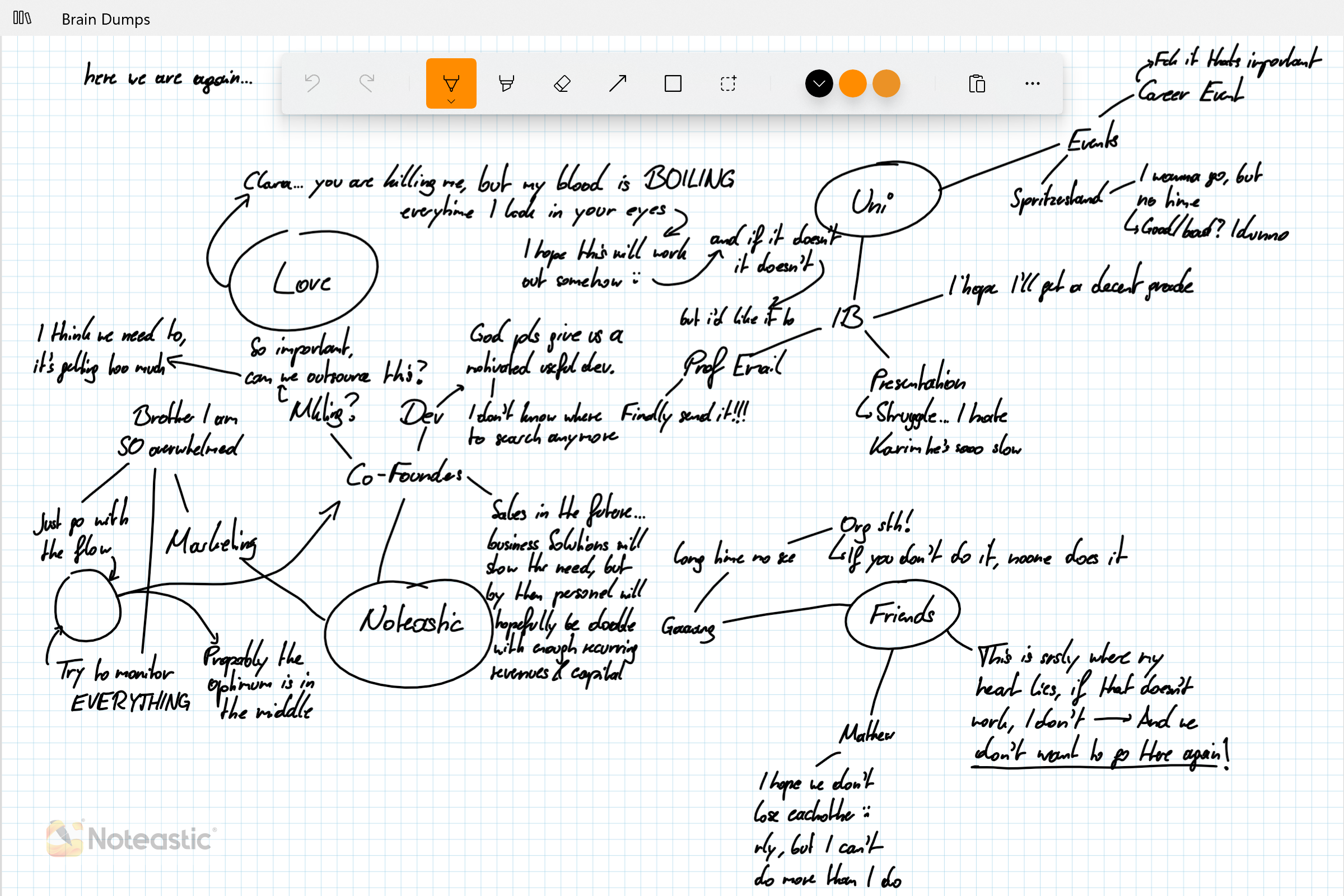
How to cope with cognitive overload
A step by step guide for clearing your mind of clutter
I must admit, being in my 20s I feel like my brain is exploding on a daily basis. Being in everyday situations, attending interesting university lectures, meeting new people, working on super exciting side projects or - what happens most of the time - all of them at once. When there is so much happening in my brain at once, it often paralyzes me. And it feels awful because in this state of mind I am totally unable to concentrate on anything for more than 5 seconds, let alone make intelligent decisions. But I found out what helps and why it helps!
What is actually happening and why?
The scenario I just described is known in literature as “cognitive overload” or “racing thoughts”. However, the term “racing thoughts” is more frequently used in connection with diagnosed psychological disorders like bipolar disorder, OCD, or ADHD. The term describes an uncomfortable state of mind in which your brain either keeps looping back to a distinct thought or randomly bounces between all kinds of thoughts again and again. The reason for cognitive overload is often anxiety or overstimulation of the brain, and it is more common than you think!
How do I cope with cognitive overload?
Distract yourself
There are two main strategies to pursue in order to cope with an overloaded mind. It is quite simple: fight or flight! One main strategy is to try to distract yourself and get the pressure out of your head. Therefore, you could do mental exercises like meditation or progressive muscle relaxation. For me, I love turning on my favorite calm song playlist and putting the volume very low so that I have to be quiet and concentrate in order to hear the music. This has often saved me from unintentionally lying awake for a whole night!
Take your thoughts head-on
If flight does not work or you don’t want to be distracted, tackling your thoughts head-on is the way to go. Give your mind active permission to delve deep into all the topics you care about and all the doubts, worries, and eventualities you think of. However, after giving your brain permission, the most important step follows: Take a pen and write EVERYTHING down. This technique is called brain dumping, and it is a radical tool to clear your working memory from all the clutter it has attained.
But what is the working memory actually? This is your brain’s domain in which it consciously processes external stimuli, retrieves knowledge from your long-term memory, and combines those assets in order to execute problems. This is the exact spot that is overcrowded, cluttered, and going mayhem when you experience cognitive overload. And guess what? Writing your thoughts down is a common tool to relieve your working memory. Writing your thoughts down gives your brain the permission to kick them out of the short-term storage because they are saved somewhere else, freeing up space and leading to a feeling of relaxation.
But back to the topic: Dump all your thoughts. And is it important to use a pen? YES!
Writing with a pen, digital or analog, has several positive effects in this unique situation. Remember, your problem is that your brain is doing backflips while you aren’t even capable of grasping one clear thought. Our main goal is pulling focus and slowing down—two proven effects of writing with a pen.
First of all, writing by hand is slow by nature. This means in order to compose the words or phrases you want to annotate, your brain needs to filter. It needs to decide in real time what kind of information is important and what isn’t.
This situation is very similar to a university classroom, where your professor is talking faster than you can actually comprehend what they are saying. You need to filter what is important and what isn’t in order to have a lead on what your professor might have meant when you review your notes after class.
Here is what my notes look like after I did some brain dumping:

Writing is more cognitively demanding than you might think! Forming words and sentences by itself forces your brain to focus. It shifts resources away from your overloaded working memory and toward areas responsible for writing and language comprehension.
However, in my opinion, the most important advantage of writing your chaos of thoughts down is the following: You grant yourself the chance to review your thoughts after you have cooled off. And this is so important! Your brain is going nuts because of thoughts and topics that are sincerely important to you. You should take them seriously by all means! Writing them down prevents you from starting at zero each time. Instead, you can track your past logic and start building on what is going on in your brain as opposed to drowning in it.
Conclusion
Cognitive overload occurs when your working memory is flooded with thoughts, doubts, and emotions. You can either distract yourself or confront the chaos head-on. The best way to bring order? Write it all down with a pen!
Remarks
I am a clear supporter of actively pursuing my thoughts, just to inform you of my bias in this manner. However, it is important that you find what works best for yourself!
Nonetheless, I hope this article will help a few poor souls get a bit of clarity into their chaos :).
All images and graphs were created in Noteastic.
References
Footnotes
-
Andres, Z. (2029, April 22). Psychologically speaking: Your brain on writing | Writing and Communication Centre | University of Waterloo Link. ↩
-
Bohay, M., Blakely, D. P., Tamplin, A. K., & Radvansky, G. A. (2011). Note Taking, Review, Memory, and Comprehension. The American Journal of Psychology, 124(1), 63-73. DOI ↩
-
Cognitive overload: Info paralysis. (2022, March 28). Mayo Clinic Health System. Link ↩
-
Cowan, N., Elliott, E. M., Scott Saults, J., Morey, C. C., Mattox, S., Hismjatullina, A., & Conway, A. R. A. (2005). On the capacity of attention: Its estimation and its role in working memory and cognitive aptitudes. Cognitive Psychology, 51(1), 42-100. DOI ↩
-
Digital Notes vs Paper Notes for 2025: Benefits of Taking Notes by Hand. (2021, April 1). Research.Com. Link ↩
-
Mendes, L. W. H. (2018). Racing thoughts: Psychopathological and cognitive mechanisms. Université de Strasbourg. ↩
-
Mueller, P. A., & Oppenheimer, D. M. (2014). The Pen Is Mightier Than the Keyboard: Advantages of Longhand Over Laptop Note Taking. Princeton University and University of California. ↩
-
Solan, M. (2023, March 13). Slowing down racing thoughts. Harvard Health. Link ↩
-
Working Memory—An overview | ScienceDirect Topics. (2016). Link ↩